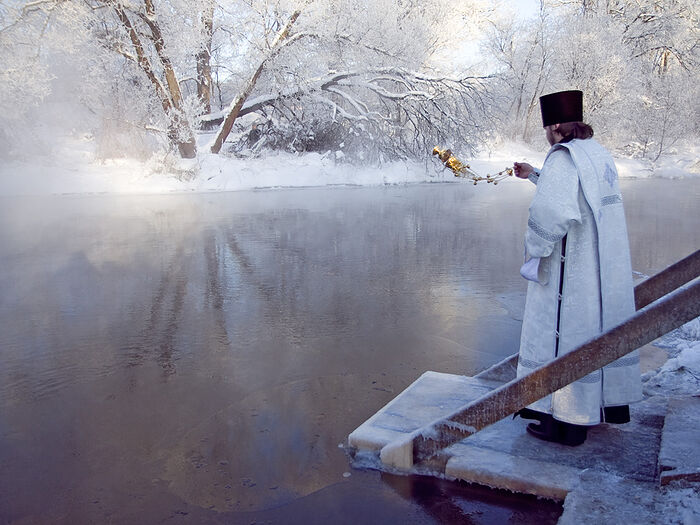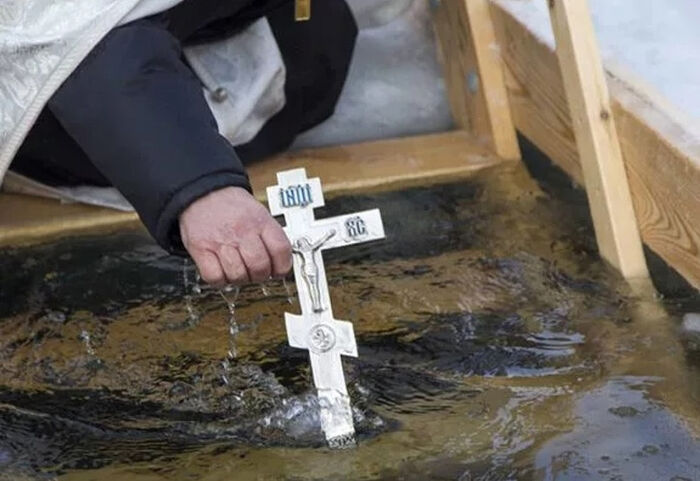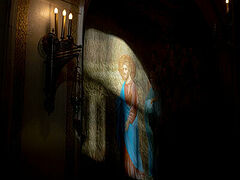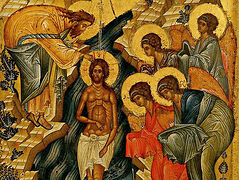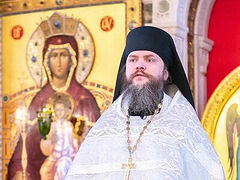In the name of the Father, and of the Son, and of the Holy Spirit!
“Today the Master hath come to sanctify the nature of water…” Thus the holy Church will now sing on the ninth ode of the canon. The present feast, as one of the stichera of the forefeast of Theophany says, is a most glorious feast, comparable to the previous feast of the Nativity of Christ: “Splendid hath the past feast been, and most glorious is the present day,” and further he indicates why: “The former was heralded by an Angel, and the latter was prepared by the Forerunner. Then blood was shed, and Bethlehem, having lost its children, wept, but now the waters are blessed and the baptismal font becomes fruitful. Then a star signaled to the Wise Men, now the Father reveals Thee to the world…”1 If there a star indicated the manger, here the Father Himself indicates His Son: This is My beloved Son (Mt. 3:17).
Theophany is a feast of the revelation of the mysteries of God, and not only the mysteries of God, but also the mysteries of this world in which we live.
Man cannot be cut off from either the visible or invisible world, for he stands at the boundary of both, for he is created of the earth, from matter, from a visible and perishable creation, but within him is embedded a soul, an angelic spirit; as one of the Holy Fathers says, this is an angel in the flesh. Man combines both worlds within himself, connecting with one through his visible body and ascending to the other through his invisible, immortal spirit.
We heard in the service for the forefeast of the Nativity that Christ is coming to take man, who has fallen to earth, back to Heaven.
Man is not cut off from visible nature. Today is revealed the mystery of Theophany, as well as the mystery of Christ’s deliverance from sin, not only of man, but of the whole world. Christ appeared, as we sang in these pre-festal days, to clothe man in the first garment, in that garment in which the first man was adorned at his creation and of which the Great Canon of St. Andrew of Crete says: “I have torn my first garment which the Creator wove for me in the beginning, and therefore I am lying naked.”2 But this was not enough: “Christ has appeared to renew all creation.”3
This inseparability of man from creature runs through the entire Divine service. Today we also prayed: “Have mercy on us and your world…” In the Christian understanding, we don’t separate ourselves from the world in which we live, and Christ appeared at the Jordan not only to restore fallen human nature, but also to renew the whole of creation through the nature of water. “Being baptized in the Jordan, O our Savior, Thou didst sanctify the waters; being touched by the hand of Thy servant, Thou hast healed the passions of the world.”4
But why is the world sanctified specifically through water?
Since the very first days of creation, water has been a spiritualizing, sanctifying nature.
Before the world existed as such, the Holy Spirit hovered over the waters, as over the purest matter.
The Lord created water in order to give it a sanctifying, purifying, revitalizing nature. By water, sin was drowned in the time of Noah; by water, the sacrifice offered by the righteous man was burnt. Water was seen to be purifying in the Old Testament. Then will I sprinkle clean water upon you, says the Prophet Ezekiel, revealing the mystery of the spirit, and ye shall be clean: from all your filthiness, and from all your idols, will I cleanse you. A new heart also will I give you, and a new spirit will I put within you (Ezek. 36:25-26).
The nature of water is sanctified that it might, above all, sanctify man through itself. Each of us is sanctified by the Baptism in the Jordan at our spiritual birth, for the sanctification of the Jordan sanctifies water for the Sacrament of Baptism.
But that’s not all. Not only is man purified by water at his spiritual birth, but through the same nature of water, all of nature is purified.
Man is the crown of creation, its highest point, and everything he puts his sinful seal on becomes infected with the same sin. Through man, the whole of nature is in sin. For we know that the whole creation groaneth and travaileth in pain together until now (Rom. 8:22), says the Apostle Paul. Therefore, the Lord sanctified the nature of water that He might sanctify all of nature through it.
We completely forget how closely we’re connected with the Heavenly world, with the angels and saints; we forget about this connection, without which our Church doesn’t exist, without which we can neither celebrate the Divine services nor hope for eternal life.
We also feel no connection with the lower world. We believe that man and nature exist separately. At best, we recognize that nature is alive, that plants and animals are alive, since that’s difficult to deny. But we have lost what we should have known: God created the world, He is Life, and everything created by Him lives by Him—or there is no God at all. God in creation appears first of all as Life, and this is revealed to us believers precisely today, as we stand here with St. John the Baptist, to whom we sang that he might rise with us and seal our singing, that he might again lift his gaze to the Holy Spirit and be spiritually united with us at this great Divine service: “Thy hand which touched the head of the Master, free of corruption, the same with which thou didst point Him to us by the pointing of the finger, raise thou it to Him for our sakes, O Forerunner. Thou hast attained great favor, since it was testified of thee by Him that thou art the greatest of all the Prophets. And thine eyes also, which did behold the All-Holy Spirit descending in the likeness of a dove, raise to Him, O Baptizer, granting mercy for us. Come, thou, and stand with us, concluding our praise and beginning the celebration of the feast.”5 Today is a feast not only for men who receive the garment of corruption at Baptism, but also a feast for the whole of nature, that nature “may be adorned in its first garment,” for it also lives and is infected by our sin. If each of us, having awareness, can and must repent, and in repenting, as the Holy Church believes, put on the garment of incorruption, then nature must also receive purification from the sin that we introduce into it; and this purification is given to it through the great feast of the Baptism of the Lord, when the whole of creation is renewed through the nature of water.
The holy Church addresses the mountains, and the hills, and the heavenly bodies, and the darkness, the frost, the angels, and the “multitude of people” alike, calling them to “sing and exalt the Lord.”6 But the highest stage in this creation is occupied by man, especially those who are glorified—the venerable and righteous and the humble of heart.
Today we celebrate the Great Blessing of Water, and we celebrate it not only as people who have gathered in this church to pray here and remember what once happened, to remember that the Lord once came to be baptized by John. The Church is once again revealing our connection with all of nature. We filthy sinners don’t feel this connection between the seen and unseen worlds, between man and the elements, between man and the world—and that’s why we’re so lonely, that’s why we don’t understand the services that we celebrate.
Is it possible to say that there’s a man and dead matter when we celebrate the Sacrament of Baptism with water? Through this water, through this material, birth is accomplished again—spiritual birth. This very ordinary water receives spiritual gifts of grace; it’s sanctified, and through it we are sanctified. Another great Sacrament—Chrismation—is accomplished through chrism. Chrism is a simple, fragrant substance; but when it’s sanctified, it acquires those properties that give us who have been chrismatedd the gifts of the Holy Spirit. Then bread and wine are consecrated and offered; they become the Body and Blood of the Lord, and they make us the Body of Christ when we partake of them, as says St. John Chrysostom.
Therefore, our connection with visible nature is so close because everything that lives, lives as a creation of God, lives by its Creator—the True Life.
We must remember on this feast of the consecration of the nature of water, that man stands on the borderline of two worlds: the invisible world, with which he is connected by his immortal soul, his spirit (this world elevates us to angels and bodiless spirits), and the visible world—through his body, which conducts the grace of the Holy Spirit to the soul and which becomes as immortal as the soul if we live in Christ. We—a microcosm—carry the union of two great worlds within us.
On this greatest of days, the Church believes that the Lord is baptized again and renews the nature of water with Himself; and through this, all of nature is renewed and receives its primordial garment again, which we also received in Baptism but then sullied by our falls. And then the Lord, by His mercy, through the Sacraments of Repentance and Communion again makes it incorruptible. Our greatest duty on this feast is to feel our connection with both worlds, with the world above and the world below.
This water, which lives and bears sanctification, true incorruption, cleansing us with the washing of regeneration (Tit. 3:5) in the Sacrament of Baptism, gives us spiritual birth, sanctifies both inanimate and animate creations: plants and animals—the whole of nature, which man, in his blindness, calls dead.
We must remember that we don’t exist separately, that we’re connected with this world as its crown, and that we must raise this world to the unseen world (St. Gregory the Theologian), we must raise it through the soul primarily through our body; we must purify the world that lies in evil and not pollute it again and again with our sin.
And on this day we’re not alone—not only those gathered here, but the whole Church, visible and invisible, both men and angels, glorify the most honorable and magnificent name of the Father and the Son and the Holy Spirit, now and ever and unto the ages of ages.
Amen.

